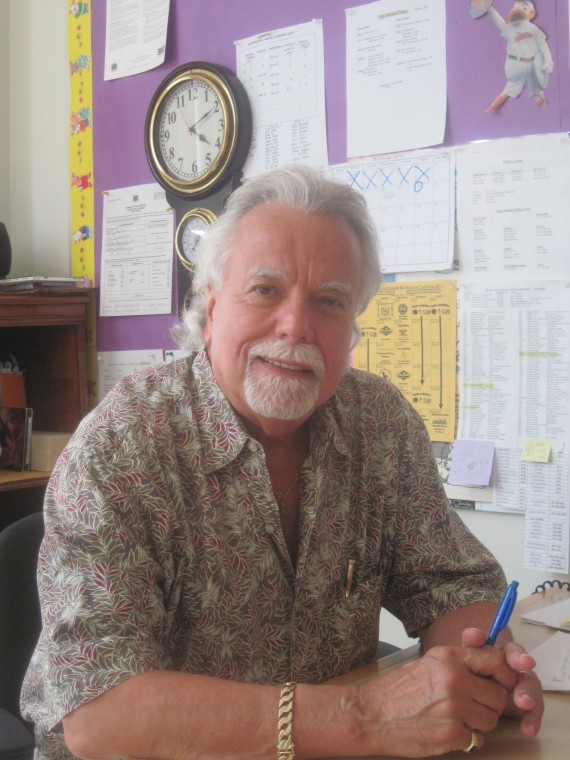Len Fisher still recalls the advice a professor gave him while he was studying for a post-graduate education degree: “If you find a school system you like. Stay there.”
Recently retired after 46 years in the East Williston School District, the Willets Road School guidance counselor said he never figured on such a long tenure, but the job just took on its own momentum.
“I think people liked me here. And I was comfortable here,” Fisher said last week, at the end of his 15th season as director of the school district’s summer recreation program.
He’s so comfortable in East Williston, the amiable veteran guidance counselor said he plans to come back next summer to direct the recreation program, and continue to direct it for the foreseeable at Willets Road and the North Side Schools.
The summer program is privately funded, with a tuition of $1,495 for each of the 286 students from kindergarten through grade seven in the program that ran from July 5 through Aug. 12.
And he’ll be available, if needed, to advise his successor, who he said he’s already briefed.
Otherwise, Fisher plans to let the future unfold as it will, rather than spend a lot of time planning and organizing it, as he’s done as a teacher, principal and counselor.
“There’s going to be more grandpa time,” said Fisher, whose two grandchildren live just a short drive from where he lives in Melville.
“Whatever’s going to be is what I’m going to be doing next year. I’m just going to see what happens. I’m not going to worry about it,” he said in his summer office at the Willets Road School. ‘I love what I do.”
He’s proven himself to be adaptable over his nearly half century in the East Williston School District.
Fisher started teaching fourth grade at the North Side School in 1965, subsequently becoming a guidance counselor three years later.
That was after he had attended the New York State University of Albany on scholarship for a master’s degree intended as preparation for administrators aiming to become deans of students and principals. That career path didn’t appeal to Fisher.
“I never wanted to be a principal. You have to answer to the world when you’re a principal,” he said.
But in 1977, while he was a guidance counselor, he served as interim principal for a year. But his focus in looking back on his career is set on his legacy as a guidance counselor through numerous changes in school board administrations and school administrations over the years.
“God knows how many kids and parents I’ve seen,” Fisher said.
He doesn’t often hear from students he’s counseled. But he received a phone call from a former student, wishing Fisher good luck in his retirement. And the student recalled how Fisher had succeeded in cajoling the young man back to his first grade class.
The atmosphere has changed since then, when he always wore a jacket and tie. He resists the suggestion that he’s “old school” in his dress and his overall tact, preferring to call it “common sense,”
That’s something that he thinks is sadly lack in many parents today.
“It’s common sense. It’s great to be friends with your child, but there have to be parameters,” he said, adding that many parents in the district are extremely defensive about their children, and sometimes suggest that school administrators “fix” their child’s problem.
“By the time they get to middle school, things are already set up. I think the parents don’t know they need to be in charge. There’s a certain respect that’s lacking,” Fisher said.
That’s particularly evident to him when he hears students telling teachers and administrators, ‘We pay your salary” or “You’re working for us.”
What’s also evident in students’ attitudes is their wholesale socialization around the Internet and cell phones, which have ushered in a new wave of behavioral problems among kids who are technically sophisticated, but lacking in sound judgment.
“A lot of kids don’t realize how damaging they can be,” both to themselves and others.
He said he believes kids in the East Williston schools have gotten savvier about the potentially adverse consequences of prankish online behavior. Risque pictures on Facebook pages can directly effect a student’s chances for admission in the highly competitive admissions environment at colleges and universities – as well as job prospects.
Noting that students are not supposed to use the cell phones they all carry during school hours, it’s a technical distraction Fisher doesn’t mince words about.
“If it was up to me, get rid of them. Parents have to know when their kids urinate and defecate,” he said of the omnipresent technology.
And he said digital technology seems to be shifting all of some kids’ attention to online destinations in preference to traditional outdoor activities.
“It’s a different time. Things have changed and I’m worried about it,” Fisher said. “They don’t play ball or go out on their bikes. They’re sitting in front of their computer screens.”
He said he still “stressing” over the kids he’s been counseling, and knows he needs to “let go,” but isn’t finding it an easy transition. Although Fisher’s not leaving entirely, he’s already anticipating the unfamiliarity of the absence of his routine over more then four decades.
“I think every time I hear the word ‘school’, it feels emotional,” he said. “It’s different. It feels good.”
The best feeling Fisher has right now is the satisfaction he feels about doing his job consistently for more than 40 years.
“I feel I’ve been effective, that I’ve been able to work with kids,” Fisher said.



